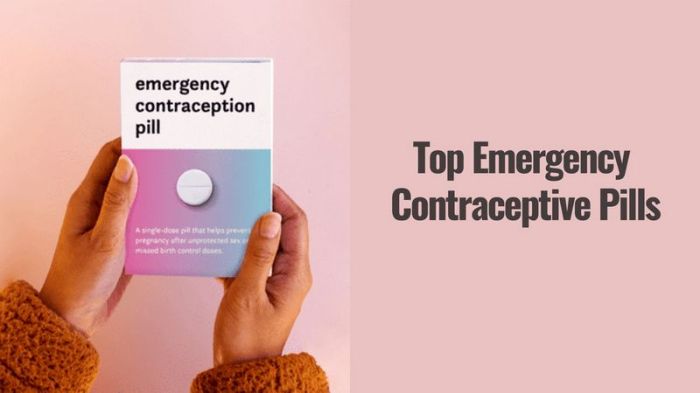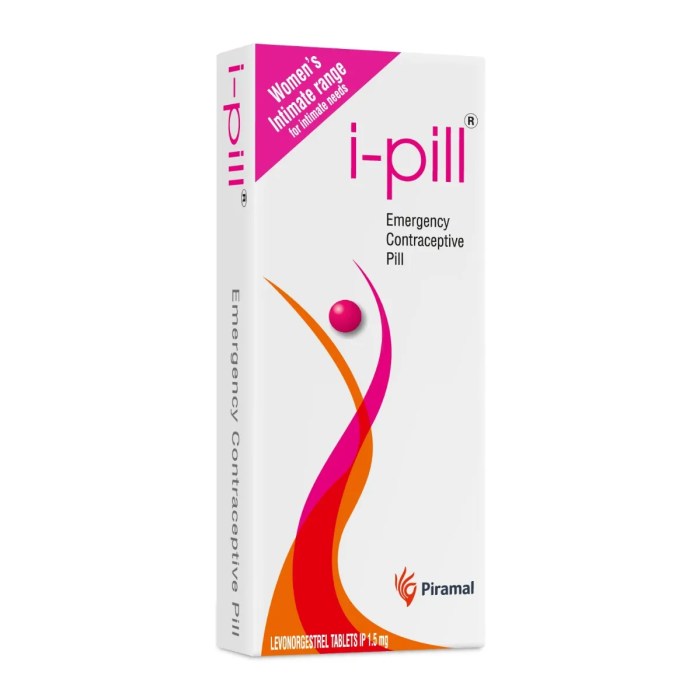
Embark on a journey to explore Emergency Contraceptive Pills, diving into their purpose, benefits, side effects, and more in a simple yet profound manner that resonates with readers.
Unveil the different aspects of Emergency Contraceptive Pills, shedding light on their significance and impact on reproductive health.
Emergency Contraceptive Pills

Emergency contraceptive pills, also known as morning-after pills, are medications taken after unprotected sex to prevent pregnancy. They are not meant to be used as a regular form of contraception but rather as a backup method in case of emergencies or contraceptive failure.
Brief History
Emergency contraceptive pills have been available since the 1960s, but their widespread use and availability have increased in recent years. The first dedicated emergency contraceptive pill was approved by the FDA in 1998, revolutionizing the way women could prevent unintended pregnancies.
Types of Emergency Contraceptive Pills
There are two main types of emergency contraceptive pills: ulipristal acetate (UPA) and levonorgestrel (LNG). UPA is a newer option that is more effective than LNG, especially if taken within 72 hours of unprotected sex. LNG, on the other hand, is less potent but still widely used and available over the counter.
Mechanism of Action
Emergency contraceptive pills work by preventing or delaying ovulation, fertilization, or implantation of a fertilized egg in the uterus. They do not terminate an existing pregnancy but rather prevent it from occurring in the first place. It is crucial to take these pills as soon as possible after unprotected sex to maximize their effectiveness.
Benefits of Emergency Contraceptive Pills
Emergency contraceptive pills offer several advantages for individuals in need of emergency contraception. These benefits play a crucial role in preventing unintended pregnancies and providing a sense of control over reproductive health.
Effectiveness of Emergency Contraceptive Pills
- Emergency contraceptive pills are highly effective when taken within the recommended timeframe after unprotected intercourse, reducing the risk of pregnancy significantly.
- Compared to other forms of contraception, such as condoms or spermicides, emergency contraceptive pills have a higher success rate in preventing pregnancy when used correctly.
- They can be used as a backup method in case of contraceptive failure or unprotected sex, offering an additional layer of protection.
Importance of Timely Use
- Timely use of emergency contraceptive pills is crucial for maximizing their effectiveness and reducing the chances of unintended pregnancy.
- It is recommended to take emergency contraceptive pills as soon as possible after unprotected intercourse to ensure the best possible outcome.
- Delaying the use of emergency contraceptive pills can decrease their effectiveness and increase the risk of pregnancy.
Role in Preventing Unintended Pregnancies
- Emergency contraceptive pills play a vital role in preventing unintended pregnancies by providing a safe and reliable option for emergency contraception.
- They offer a second chance to individuals who may have had a contraceptive failure or engaged in unprotected sex, empowering them to take control of their reproductive health.
- By using emergency contraceptive pills responsibly and timely, individuals can avoid the emotional, physical, and financial challenges associated with an unintended pregnancy.
Side Effects and Risks
Taking emergency contraceptive pills can come with some side effects and potential risks that individuals should be aware of before use. It is important to understand these factors in order to make an informed decision about using emergency contraception.
Common Side Effects
- Nausea and vomiting
- Headaches
- Breast tenderness
- Fatigue
- Irritability
Potential Risks
- Changes in menstrual cycle
- Allergic reactions
- Blood clots
- Ectopic pregnancy
Long-term Effects and Health Concerns
It is important to note that emergency contraceptive pills are not intended for regular use and should not be relied upon as a primary method of contraception. Long-term use can disrupt hormonal balance and lead to irregular menstrual cycles.
Tips for Minimizing Side Effects
- Take the pill with food to reduce the risk of nausea
- Avoid alcohol and smoking while taking emergency contraceptive pills
- Stay hydrated to help manage headaches and fatigue
- Consult a healthcare provider if you experience severe or persistent side effects
Emergency Contraception vs. Regular Birth Control

When it comes to contraception, it’s essential to understand the key differences between emergency contraception and regular birth control methods. Emergency contraception is designed for use after unprotected sex or contraceptive failure, while regular birth control methods are used consistently to prevent pregnancy.
Effectiveness Comparison
- Emergency contraceptive pills are most effective when taken as soon as possible after unprotected sex, with effectiveness decreasing over time. In contrast, regular birth control methods, such as the pill or IUD, are effective when used consistently as directed.
- Emergency contraception is not as effective as regular birth control methods in preventing pregnancy. It is meant to be a backup option, not a primary form of contraception.
Appropriate Usage
- Emergency contraception should be used in situations like condom breakage, missed pills, or sexual assault. It is not meant to replace regular birth control methods.
- Regular birth control methods should be used consistently to prevent pregnancy and can offer additional benefits like regulating menstrual cycles and reducing acne.
Inclusion in Reproductive Health Plan
Regular birth control methods play a crucial role in a comprehensive reproductive health plan by providing ongoing protection against unintended pregnancy. Emergency contraceptive pills are a valuable backup option in case of emergencies but should not be relied upon as the primary method of contraception.
Last Word
In conclusion, Emergency Contraceptive Pills serve as a crucial option for preventing unintended pregnancies, offering a timely solution with important considerations for overall well-being.
Query Resolution
How do Emergency Contraceptive Pills work?
Emergency Contraceptive Pills work by preventing ovulation or fertilization, disrupting the normal hormonal patterns in the body.
Are Emergency Contraceptive Pills 100% effective?
No, Emergency Contraceptive Pills are not 100% effective but significantly reduce the risk of pregnancy if taken within a specific timeframe after unprotected intercourse.
Do Emergency Contraceptive Pills have long-term effects?
There is no evidence to suggest that Emergency Contraceptive Pills have long-term effects on fertility or overall health.





